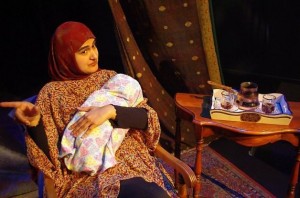By Stephen Rajeckas
Correspondent
Students slowly filled the seats as a musician played an enchanting melody on the tear-shaped oud, an Arabic version of a guitar. A cloth with a colorful pattern of black, red and white sat on a table on the set, and a few simple objects sat on it: a teapot, a cup a cooking pot and an orange.

The Library Auditorium became a window into the Islamic culture for two hours on Monday, Feb. 24, when playwright Rohina Malik performed “Unveiled,” a one-woman play she both wrote and acted in.
Accompanied by Scott Wilson playing the oud, the production explored racism and hate crimes in Islamic culture.
Broken up into parts, each telling the story of a different character, Malik masterfully played the roles of five very different women.
Malik did a fantastic job of keeping the audience entertained with light humor and getting across some very poignant points about the harsh realities of life as an Islamic woman.
Her portrayal of Shabana, an Islamic rapper from London in her twenties, seemed to be the favorite of the audience. The focus of Shabana’s story was her unorthodox rapping hobby clashing with her traditional Islamic heritage. Malik had a surprising flow to her rhymes, using hip-hop to express Shabana’s feelings on life as a female Islamic rapper.
Malik held a Q&A session after her performance.
“It’s a combination of me as a playwright and a person,” she responded when asked if the play was based on true events.
When asked about what causes hate crimes, she said “negative stereotypes and degrading language” are at the core.
The discussion turned to the challenges inherent in becoming a playwright as an Islamic woman. As a South Asian, her parents naturally had a problem with her going into theater. She first got into theater as a teenager, and “it took a long time” for her parents to accept her decision, Malik said.
After the show, some students left with a different view on Islamic culture Malik incorporated in her show.
“It was an eye-opening experience,” said Amanda Voorhees, a sophomore special education and math dual major.
With a slight grin on her face, Malik summed up her night as “a positive experience.” Going on the smiles on the faces of those leaving the theater, it was a sentiment shared by many.






